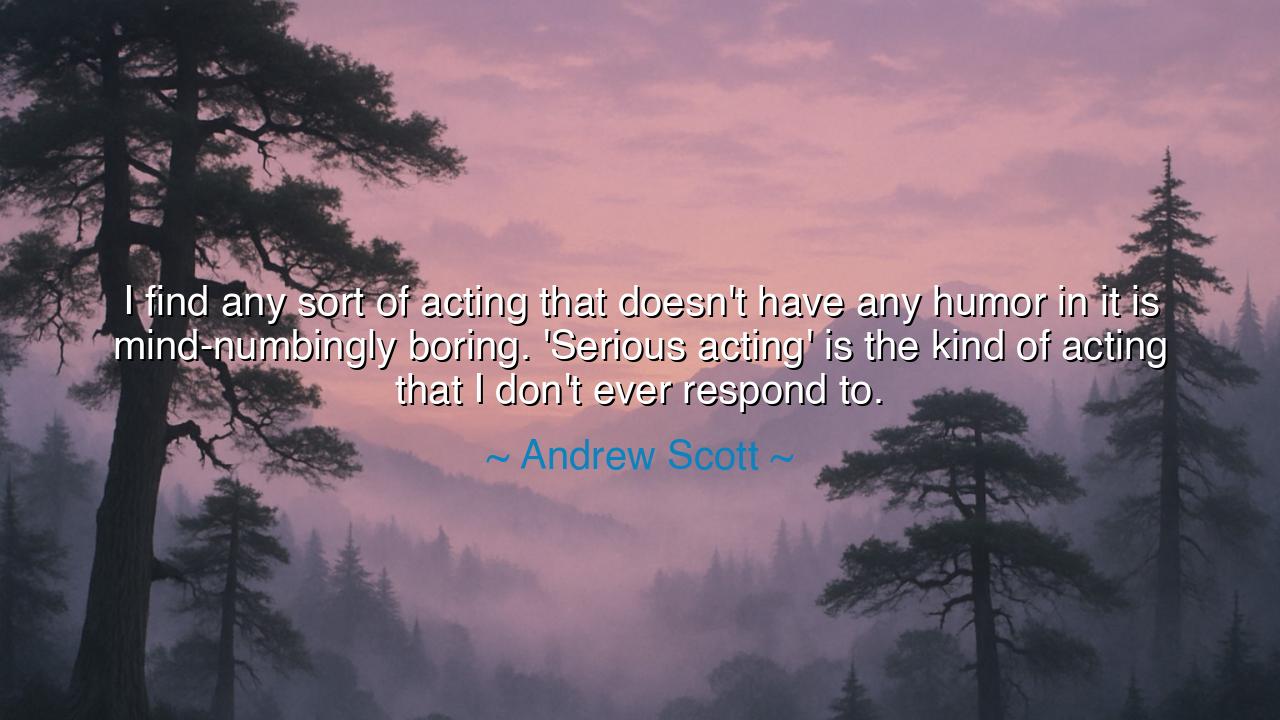
I find any sort of acting that doesn't have any humor in it is
I find any sort of acting that doesn't have any humor in it is mind-numbingly boring. 'Serious acting' is the kind of acting that I don't ever respond to.






The words of Andrew Scott strike at the heart of art and humanity alike: “I find any sort of acting that doesn’t have any humor in it is mind-numbingly boring. ‘Serious acting’ is the kind of acting that I don’t ever respond to.” At first glance, this may seem merely a comment on performance — a preference of one style over another. Yet beneath it lies a profound philosophy of life and creation, one that reaches beyond the stage and into the soul. Scott speaks not only of acting, but of the human condition itself: that even in the gravest of moments, there must be a pulse of humor, for without it, life loses its color, its rhythm, its humanity.
In these words, Scott reminds us that humor is not the opposite of seriousness, but its companion. To act without humor — to live without humor — is to deny the complexity of existence. The ancients knew this truth well. The Greeks, who gave birth to both tragedy and comedy, understood that they were not enemies but twins. They believed that no story was complete without both the tears of sorrow and the laughter of relief. Andrew Scott, in his way, revives this ancient understanding: that art, to be alive, must hold both darkness and light in its hands. For humor is not a distraction from truth — it is truth seen through the eyes of compassion.
What Scott calls “serious acting” — the kind that drapes itself in solemnity and self-importance — often forgets that real emotion cannot breathe without air. It suffocates beneath its own gravity. But humor, even the smallest spark of it, gives art — and life — its breath. The greatest actors, like the greatest philosophers, understand this balance. Think of Laurence Olivier, who once said that the most tragic characters must still have a glimmer of laughter in them, for laughter reveals the depth of their humanity. Even the doomed Hamlet teases and jests, his wit as sharp as his pain. Without those moments of levity, his tragedy would feel hollow, a statue without movement, a heart without warmth.
Consider, too, the story of Charlie Chaplin, whose genius lay in his ability to weave laughter and sorrow into one seamless thread. Beneath the comedy of the tramp lay poverty, isolation, and yearning — yet Chaplin never allowed despair to dominate. His humor did not erase his suffering; it redeemed it. That is the secret Scott alludes to: the greatest art — and the truest humanity — is born where humor meets heartbreak, where light meets shadow. For only when we can laugh through pain do we show that our spirit cannot be conquered by it.
Scott’s rejection of “serious acting” is not a rejection of depth, but of pretense. He speaks against the false notion that seriousness is the same as sincerity. In truth, humor often reveals sincerity more fully than solemnity ever could. A person who can laugh at themselves shows not weakness, but wisdom — the awareness that life, with all its tragedy and absurdity, is far too vast to be carried on straight shoulders alone. The actor who brings humor to the darkest role does what the philosopher, the poet, and the saint have all sought to do: to make truth bearable, and in doing so, to make it beautiful.
The lesson, then, is clear: let humor be part of everything you do, especially in the places where gravity reigns. When you speak, when you create, when you suffer — do not fear to laugh. Laughter does not diminish seriousness; it ennobles it. It is the mark of perspective, of grace, of the soul that refuses to drown in its own depth. In your own life, when hardship comes, remember that even the gods, as the ancients told, laughed at the folly of fate. To laugh is not to mock, but to rise above — to affirm that even pain cannot take away your ability to feel joy.
And so, dear listener, take to heart the wisdom of Andrew Scott. Whether you are an artist or simply an actor upon the stage of life, bring humor to your role. Let it lighten your burdens and deepen your truths. Do not strive to be merely serious; strive to be alive. For humor is the divine spark within the mortal frame, the song that turns suffering into story, tragedy into art, and existence into something worth living. In laughter, the soul remembers its freedom — and that is the highest performance of all.






AAdministratorAdministrator
Welcome, honored guests. Please leave a comment, we will respond soon